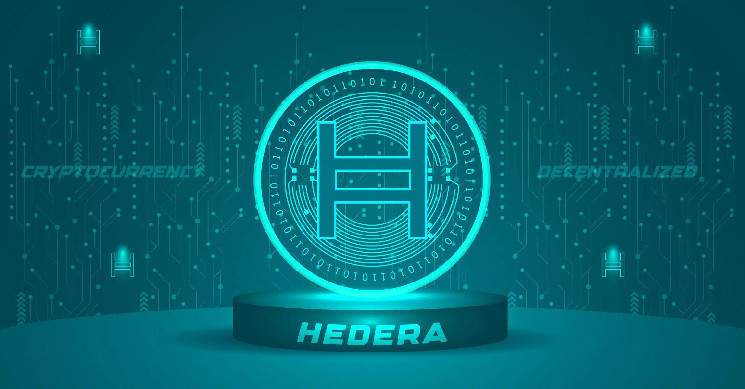EDF and Hedera have partnered to explore blockchain to issue Renewable Energy Certificates.
- Powered by Hedera Guardian, the duo seeks to set new standards in Carbon credit verifications.
EDF, a French multinational electric utility company owned by the government of France has teamed up with Hedera (HBAR) in a strategic partnership. With this collaboration, EDF aims to build real-world asset (RWA) use cases on Hedera Guardian.
EDF Leads the Charge for Hedera Guardian
According to the announcement, EDF has completed a Proof-of-Concept (PoC) on Hedera, with anticipation to transform and automate the management of Renewable Energy Certificates (RECs).
In a series of posts on the social media X platform, the HBAR Foundation outlined the importance of the partnership between Hedera and EDF. The Foundation highlights that the EDF is at the forefront of the Hedera Guardian project initiatives like electric vehicle RECs, green Hydrogen certification, and decentralized energy trading with Google Cloud.
France's state owned energy supplier and @Hedera Governing Council member, @EDFofficiel, is building multiple #RWA use cases on the #Hedera Guardian 🇫🇷
As part of #EarthWeek, we'll be highlighting these sustainability and #ReFi use cases that are only made possible by Hedera 🧵 pic.twitter.com/983aBUzVrw
— HBAR Foundation (@HBAR_foundation) April 24, 2024
Notably, the Hedera Guardian recently introduced the REC Proof-of-Concept (PoC) into its ecosystem. As a result of this innovation, EDF, Rekursive Labs, and REDEX, will enable end users to retire modest amounts of RECs in real time on Hedera. This empowers individuals to send a clear market signal that they are concerned about how the power they consume is produced.
The HBAR Foundation claims the sole purpose of the PoC was to set up a genuine and transparent system for monitoring and confirming the renewable energy sources that fuel the charging infrastructure of Electric Vehicles (EVs). Achieving this purpose would require the project to fractionalize Renewable Energy Certificates (RECs). According to the Foundation, this process would allow for a more precise alignment with the different energy required to charge an EV.
As a result of the partnership with EDF, the Hedera Guardian permitted real-time tracking, matching, and secure issuing of RECs, overcoming the limitations of existing REC systems. This new solution enables electric car owners to make ecologically aware decisions when charging their vehicles.
Edouard Lavillonniere, Managing Director at EDF Lab Asia Pacific expressed excitement for the collaboration stating, “With our expertise in renewable energy and electrical vehicle charging, EDF is the ideal partner for this collaboration. Our commitment to sustainability aligns perfectly with the vision of a greener future enabled by DLT. We believe this collaboration will drive positive change in the renewable energy sector. We are shaping a future where renewable energy adoption is streamlined, transparent, and accessible to all.”
Understanding the Hedera Guardian
Introduced by the Hedera Foundation Sustainable Impact Fund (SIF), the Guardian is a groundbreaking tool that seeks to transform the way carbon credits are validated and verified. Reflecting on Crypto News Flash’s prior findings, Guardian uses blockchain technology to expedite the certification and verification processes.
However, this efficiency is more than just speed. It also enhances the quality and trustworthiness of the credits issued, therefore, strengthening the entire carbon market.
Per HBAR, the cryptocurrency associated with Hedera is currently down by 11% within the past 24 hours to trade at $0.117. Also, the market capitalization has decreased by 10.7% to $4 billion, and trading volume dropped 73% to $930 million.
While current price outlook shows the news has not stirred investor optimism, the trend might change in the future.
